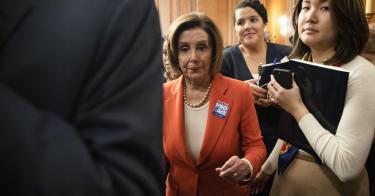The difference between command economies and market economies? In a word, freedom. Command economies put government officials in charge of what’s owned and produced, while market economies allow individuals, families, and employers to decide how best to live their lives and run their businesses.
It turns out that people are far better at making decisions that impact their everyday lives and those around them than far-off and unfamiliar government officials. That’s why the centrally-planned economies of Eastern Europe produced significantly lower family incomes and less freedom during the Cold War than predominantly market economies. It is also why they eventually collapsed.
While Americans continue to enjoy a relatively robust market economy, some politicians in Washington seem willing to head further in the direction of history’s failed central planners, especially when it comes to the U.S. labor market.
For example, after struggling to include an economically destructive $15 national minimum wage in a partisan coronavirus so-called “rescue” package, some liberal lawmakers decided they should further insert themselves into the operations of businesses both big and small.
As Sen. Ron Wyden, D-Ore., and Chairman of the Senate Finance Committee said, “We couldn’t get in the front door or the back door, so we’ll try to go in through the window.” He claimed that, “The American people elected Democrats to get things done, and they aren’t going to accept ‘process’ as an excuse for failing to [enact a $15 minimum wage].”
The “process” that Sen. Wyden brushes aside as an “excuse” refers to a U.S. law that governs what can be included in budget reconciliation bills that bypass the Senate Filibuster and thus allow for a simple fifty-one-vote majority to pass a law, instead of the usual sixty vote requirement.
So after failing to include a job-killing $15 nationwide minimum wage in their partisan coronavirus package, Sen. Wyden and Sen. Bernie Sanders came up with a “Plan B.” It would “impose a 5 percent penalty on a big corporations’ total payroll if any workers earn less than a certain amount,” resulting in potentially multi-billion-dollar penalties on companies for employing even one worker at a wage lower than some lawmakers arbitrarily deem appropriate (presumably $15 per hour).
That’s pretty audacious coming from a bunch of politicians who have little or no experience managing a businesses, and whose only experience in adjusting to increased costs is to pass the buck to younger and future Americans by raising the federal debt.
Younger Americans would be the same people hurt most by this move to penalize companies for employing low-skilled and entry-level workers. This is because the penalties will take away job opportunities for young Americans to get their foot in the door and gain experience.
The proposed micromanagement went further. Since policymakers realize that companies would respond to wage mandates by automating and outsourcing low-wage jobs, Sen. Wyden said his proposal would impose measures “to prevent companies from trying to outsource labor” such as moving jobs overseas or replacing employees with contractors.
If Democrats had not, at least temporarily, abandoned their Plan B wage mandate, those preventative measures might have meant requiring employers to justify their business decisions—such as hiring contractors—to government officials. At that point, government interventions in big businesses would impede the operations of the very smallest of businesses—independent contractors and freelancers, which represents a growing line of flexible work in which one out of three Americans now participate, in some capacity.
But working for one’s self is also under threat by government officials who are beholden to labor unions that—instead of gaining members by providing things that workers value—are using their power and influence over liberal lawmakers to enact legislation that would help them drive out non-union jobs and livelihoods.
Next week, the House will debate the PRO Act, which AFL-CIO union leader Richard Trumpka previously warned lawmakers that, “Those who would oppose, delay, or derail this legislation, do not ask us—do not ask the labor movement—for a dollar or a door knock. We won’t be coming.”
Once considered just a union-wish-list, this bill now has a better shot at completely upending the labor market in the United States.
For instance, among other things, the PRO Act:
-
Threatens the livelihoods of tens of millions of independent workers.
-
Violates’ workers’ privacy by granting union bosses greater access to workers’ personal information than federal, state, or local lawmakers.
-
Strips workers of the basic democratic right to secret ballot elections.
-
Invalidates twenty-seven states’ right-to-work-laws that prevent workers’ from having money taken from their paychecks without consent and given to unions that they do not want to represent them.
In effect, the PRO Act unwillingly cedes control to unions over many of the aspects that affect workers’ livelihoods and employers’ operations.
Policymakers’ job is to support and defend the U.S. Constitution—not to manage the households and businesses of individuals, families, and employers, nor to grant power to outside organizations—like labor unions—to manage other people and employers.
Employer mandates, punitive tax penalties, and labor unions cannot create higher incomes; they can only redistribute and reduce incomes. But when policymakers reduced unnecessary regulations and lowered taxes, and as private sector union membership declined, businesses had more to invest in their workers and the wages of the lowest 10th percentile of earners increased more than any other group—by 14.6% from 2016 to 2019.
Attempting micromanage companies in ways that penalize success, restrict worker freedoms, and take away opportunities is not what made America the most prosperous nation in the history of the world. These moves are characteristic of command economies, which history shows result in lower incomes, less freedom, and ultimately fail miserably.
This is not the American way.
This piece originally appeared in The National Interest https://nationalinterest.org/feature/democrats-have-secret-plan-get-15-minimum-wage-179274



